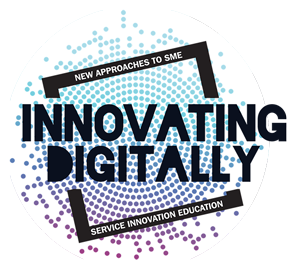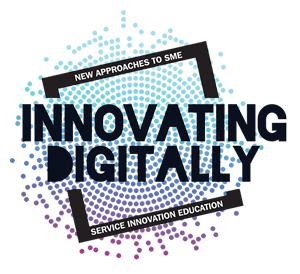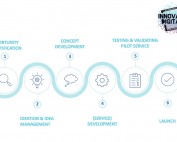More about Digital Innovation
DIGITAL INNOVATION IN SME’s
From retail to real estate, transport to tourism, services provide 150 million EU jobs and their role in driving smart, sustainable and inclusive growth is undisputed. It has long been a concern that service firms are less innovative than manufacturing industries. Fortunately, the landscape is changing and today companies have unprecedented opportunities to implement radical innovations based on transformative technology and knowledge capabilities.
Unfortunately, very few small firms are making use of this digital innovation capacity. There is a significant gap in technology adoption between SMEs and large firms and over 41% of EU companies have yet to adopt any new advanced digital technologies such as mobile apps, cloud computing, big data analytics or the internet of things. Thus, innovation and economic experts call for more intensive efforts to increase the number of entities implementing new or significantly improved products and business processes. Universities have a significant role to play in this effort.
PROJECT AIM
Universities combine theory & practice, they also set standards of future work practices, therefore Lecturers NEED up-to-date, reliable information to develop modern course curricula. Thus, the objective of Digital Innovation is clear: to gain a better understanding of how small service companies currently undertake new product development so that we can improve how innovation in services is taught.
PROJECT ACTIVITIES
The first tangible results of the project will be the intellectual outputs:
- IO1: The Digital Innovation Audit will consist of a 4-step approach in order to gauge the most appropriate digital tools available for new product innovation within the service sector. Consisting of a state-of-the-art review on new service development by micro businesses and SMEs, this research will be the corner stone for all of the follow outputs.
 IO2: Digital Innovation Benchmarking Tool – an innovative, online interactive tool for SMEs to identify their current digitisation levels. This simple, yet powerful tool will help businesses to create a benchmark of where their new product development process is in terms of utilizing digital tools which are available.
IO2: Digital Innovation Benchmarking Tool – an innovative, online interactive tool for SMEs to identify their current digitisation levels. This simple, yet powerful tool will help businesses to create a benchmark of where their new product development process is in terms of utilizing digital tools which are available.- IO3: Problem Based Learning Open Educational Resources which will engage a critical thinking approach to teaching Digital Innovation for service sector SMEs. Students will be encouraged to use existing resources on innovative digital skills as a starting point in choosing the applicable/appropriate tools which they will utilise in their PBL solutions.






